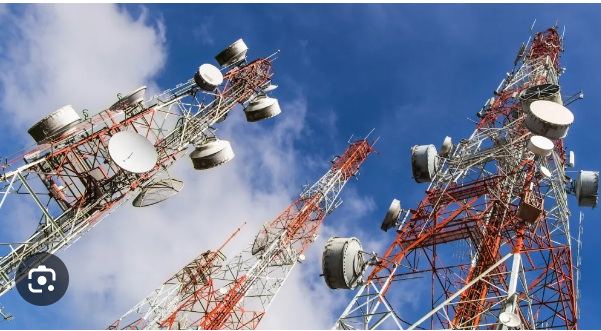
Telecommunications companies operating in Nigeria, such as MTN Nigeria and Globacom, have submitted requests to the Nigerian Communications Commission seeking authorization from the Federal Government to increase their tariffs.
This move follows significant foreign exchange losses and escalating energy expenses, which led some operators to report losses in the previous year.
The proposal from the telecom companies to adjust their tariffs comes shortly after MultiChoice, a South African pay television company, increased its prices. Additionally, various other entities including distribution companies (Discos) and brewing companies have recently implemented price hikes.
On Thursday, the telecom companies, represented by the Association of Licensed Telecom Companies of Nigeria and the Association of Telecom Companies of Nigeria, issued a joint statement urging the government to expedite the approval process.
In their statement, the two associations elaborated, “Despite facing challenging economic conditions, the telecommunications sector stands out as the only industry that hasn’t adjusted its general service pricing framework upwards in the past 11 years, mainly due to regulatory restrictions.
“In a fully liberalized and deregulated sector, the current price control mechanism, which does not reflect economic realities, poses a threat to the industry’s sustainability and could undermine investor confidence.”
The associations urged the federal government to initiate a constructive dialogue with industry stakeholders to tackle pricing challenges and develop a framework that strikes a balance between consumers’ affordability and operators’ financial sustainability.
The telecommunications industry appears to be one of the few sectors yet to adjust its prices despite the country’s increasing inflation and other economic challenges. This reluctance is attributed to regulatory constraints that hinder appropriate pricing.
Attempts to contact the Director of Public Affairs at the commission, Reuben Mouka, regarding the consideration of the request were unsuccessful as of Thursday’s press time. Calls, WhatsApp messages, and texts sent to his line received no response.
The Nigerian Communications Commission (NCC) oversees price regulation in the telecom industry, prohibiting operators from implementing price changes without regulatory approval. The regulator has indicated that a cost-based study is underway to determine whether it will approve price increases for operators.
Gbenga Adebayo, Chairman of the Association of Licensed Telecoms Operators of Nigeria, emphasized in a publication on Thursday the importance of a tariff that reflects costs accurately. He pointed out that price controls, as seen in other sectors like power, can hinder sustainable business models, leading to a decline in infrastructure quality. Unlike other sectors where consumers can seek alternative solutions, such as buying generators or utilizing government subsidies for fuel, such options are not available in the telecom sector.
The industry has faced significant rises in operational costs due to factors such as foreign exchange scarcity, network expansion, and upgrades, all of which have adversely affected operators’ profitability.
According to the National Bureau of Statistics, investment in the sector plummeted to $134 million in 2023 from $456.8 million in the previous year, marking a decline of $322 million, representing a decrease of approximately 70.5 percent.
MTN Nigeria Plc reported a significant loss of N740.4 billion for the fiscal year 2023, a substantial increase from the N81.8 billion loss reported in 2022, marking an alarming 804 percent rise, equivalent to N658.6 billion.
This dramatic financial setback is primarily attributed to the impact of the foreign exchange market liberalization that began in June of the previous year.
MTN clarified that it utilized an official exchange rate of N907.11 per dollar, based on the Nigerian Autonomous Foreign Exchange Market (NAFEM), as of December 31, 2023.
This suggests that the reported loss could further escalate if the prevailing exchange rate between the naira and dollar remains unchanged by the end of March, coinciding with the publication of its Q1 results.
Meanwhile, Airtel Africa reported a 99.6 percent decline in its post-tax profit to $2 million at the end of the nine months ending December 2023 from $523 million at the end of the same period in 2022.
The primary factor contributing to these losses, as disclosed in MTN’s audited financial results for 2023, was the liberalization of the forex market in June 2023. This led to a significant devaluation of the naira by 96.7 percent, from N461 per dollar in December 2022 to N907.1 per dollar by the end of 2023.
Tony Izuagbe, President of the Telecommunications Companies of Nigeria, expressed concern that telcos are operating at a loss and may not survive the year if tariffs remain unchanged. He cautioned that without prompt action, many telecom operators might be compelled to cease operations, depriving millions of Nigerians of vital communication services.
Izuagbe stressed that the current tariff structure is inadequate to cover service provision costs and urged regulatory bodies to address industry challenges and assist operators in maintaining service quality.
Analyzing the situation, Izuagbe highlighted that the current diesel prices, ranging from N1300 to N1500 per liter, impose a significant financial strain on operators. With an average consumption of 2000 to 3000 liters per month per base station, the costs have become burdensome.
In 2023, telecommunications companies spent approximately N429.43 billion on diesel for base stations, reflecting a 34.57 percent increase from the N319.11 billion spent in 2022. This surge was due to elevated diesel prices in 2022, which persisted at high levels throughout 2023.
In 2022, the telecommunications industry observed that the sector had been significantly affected financially due to Nigeria’s economic recession in 2020 and the ongoing Ukraine/Russia crisis. These factors have led to increased energy costs, which make up a substantial 35 percent of ALTON’s members’ operating expenses.
Telecom operators collectively utilize an average of 40 million liters of diesel per month to power telecom sites.
The President of the Association of Telecommunications Companies of Nigeria (ATCON) elaborated, stating, “We are all aware of the challenges posed by inflation, which is impacting operators. Consider the diesel price, for instance, selling at N1500 per liter, or even N1300. On average, a single base station would consume about 2000–3000 liters in a month.”
Further analysis revealed, “The cost per gigabyte of data in Nigeria is approximately N250. When you factor in the expenses associated with maintaining a base station, it becomes apparent that the revenue generated may not be sufficient to cover these costs.”
“This calculation excludes costs for colocation and infrastructure services. When these charges are factored in, operators face even greater financial strain.”
Many operators have already begun scaling back infrastructure investments to mitigate losses. There is a warning that without drastic measures, many may not survive the year.
While acknowledging the efforts of the Nigerian Communications Commission (NCC) in addressing some industry challenges, Izuagbe stressed the need for additional measures to ensure the survival of telecom operators.
He described the situation as a “chicken and egg scenario,” where improving service quality becomes challenging when operators are struggling to stay afloat.
He emphasized the importance for the NCC to take additional measures to tackle the industry’s challenges, including addressing the issue of compensating for damaged infrastructure, to ensure that telecom operators are able to deliver the level of service quality that Nigerians deserve.
A source within the commission, speaking on condition of anonymity due to the sensitive nature of the matter, indicated that telecom operators had no alternative but to seek approval from the commission for a tariff review. However, obtaining such approval might be difficult given the current high cost of living.
The source stated, “Telecommunications operators are bound by regulatory procedures and cannot adjust costs without approval from the commission. This is stipulated by law. While they may continue to advocate for changes, they are limited in their ability to unilaterally increase prices, unlike some other sectors.”
Support for Telcos Tariff Adjustment
Subscribers and economists rally behind telecom companies as they seek to hike tariffs to maintain viability.
As of March 2024, data from the NCC website indicates a subscriber base of at least 219 million.
Adeolu Ogunbanjo, President of the National Association of Telecommunications Subscribers, advocates for a modest increase in tariff rates. He contends that such an adjustment is necessary to assist operators in coping with escalating operational costs. These include expenses related to equipment procurement in foreign currencies, impacted by fluctuating exchange rates, as well as the elimination of fuel subsidies, resulting in higher diesel prices for powering base stations.
The president of NATCOM acknowledged the formidable challenges confronting telecom companies, encompassing the imperative to enhance services, deploy infrastructure, and sustain the operation of their base stations.
He emphasized that a modest uptick in tariff rates would not unduly burden subscribers but rather facilitate operators in maintaining service provision and investing in infrastructure.
“A slight adjustment in tariff rates would be beneficial to prevent suffocation of operators. They are striving to enhance services, expand infrastructure, and face challenges such as powering base stations and recent issues with undersea cables,” he elaborated.
Professor Sheriffdeen Tella, an Economics Professor at Olabisi Onabanjo University, expressed that such a move was long overdue. He noted that the operational costs for telecom operators have markedly escalated, posing challenges to their business sustainability.
“Observing the stagnant charges for sending text messages indicates that they have not adjusted their rates. The overall operational costs have risen, and it is incumbent upon the government to alleviate factors such as energy costs and interest rates. In the absence of such intervention, telecom operators are compelled to seek tariff adjustments. Hence, there is a pressing need for the government to reassess its policies and intervene in the broader economy,” he emphasized.
Tella also emphasized the necessity for subscribers to adapt to the evolving circumstances and recognize that operators cannot sustain operations while operating at a loss.
He cautioned that failure to address the situation could result in more companies exiting the market, leading to adverse repercussions for the economy.
Economist Aliyu Ilias affirmed, “The decision is reasonable, and both the telcos and the NCC have handled the situation admirably. They operate within a challenging environment similar to other industries. While it is a bold step, collaboration with the government is crucial to ascertain the extent of the proposed tariff increase.”



